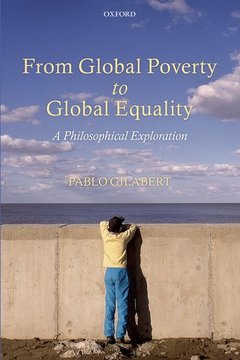From Global Poverty to Global Equality A Philosophical Exploration
Langue : Anglais
Auteur : Gilabert Pablo

Do we have positive duties to help others in need or are our moral duties only negative, focused on not harming them? Are any of the former positive duties, duties of justice that respond to enforceable rights? Is their scope global? Should we aim for global equality besides the eradication of severe global poverty? Is a humanist approach to egalitarian distribution based on rights that all human beings as such have defensible, or must egalitarian distribution be seen in an associativist way, as tracking existing frameworks such as statehood and economic interdependence? Are the eradication of global poverty and the achievement of global equality practically feasible or are they hopelessly utopian wishes? This book argues that there are basic positive duties of justice to help eradicate severe global poverty; that global egalitarian principles are also reasonable even if they cannot be fully realized in the short term; and that there are dynamic duties to enhance the feasibility of the transition from global poverty to global equality in the face of nonideal circumstances such as the absence of robust international institutions and the lack of a strong ethos of cosmopolitan solidarity. The very notion of feasibility is crucial for normative reasoning, but has received little explicit philosophical discussion. This book offers a systematic exploration of that concept as well as of its application to global justice. It also arbitrates the current debate between humanist and associativist accounts of the scope of distributive justice. Drawing on moral contractualism (the view that we ought to follow the principles that no one could reasonably reject), this book provides a novel defense of humanism, challenges several versions of associativism (which remains the most popular view among political philosophers), and seeks to integrate the insights underlying both views.
Acknowledgments. 1. Introduction: The complexity of the debate on global justice. Part I: Beyond Global Poverty. 2. Basic positive duties of justice: A contractualist defense. 3. Negative duties and the libertarian challenge. 4. The feasibility of global poverty eradication in nonideal circumstances. Part II: Toward Global Equality. 5. Humanist versus associativist accounts of global equality. 6. A humanist defense of global equality. 7. The feasibility of global equality. 8. Conclusion: Exploring responsibilities of global justice. Bibliography. Index.
A native of Argentina, Pablo Gilabert has been an HLA Hart Visiting Fellow at the University of Oxford, a DAAD Fellow at the University of Frankfurt, a Visiting Fellow at the Australian National University, and a Laurance S. Rockefeller Visiting Faculty Fellow at the Princeton University Center for Human Values. His papers appeared in numerous journals, including, among others, The Journal of Political Philosophy, Political Theory, The Philosophical Quarterly, Philosophy and Phenomenological Research, Philosophical Studies, Kant-Studien, The Monist, Social Theory and Practice, and Ethical Theory and Moral Practice. He is an Associate Professor in the Department of Philosophy at Concordia University (Montreal, Canada).
Date de parution : 03-2012
Ouvrage de 320 p.
16x24 cm
Thème de From Global Poverty to Global Equality :
© 2024 LAVOISIER S.A.S.



